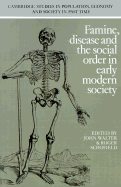Book contents
- Frontmatter
- Contents
- List of contributors
- List of figures
- List of tables
- Andrew Appleby: A personal appreciation
- A bibliography of Andrew B. Appleby's principal works in chronological order
- List of abbreviations
- 1 Famine, disease and crisis mortality in early modern society
- 2 The social economy of dearth in early modern England
- 3 Death in Whickham
- 4 The response to plague in early modern England: public policies and their consequences
- 5 Demographic crises and subsistence crises in France, 1650-1725
- 6 Markets and mortality in France, 1600–1789
- 7 Some reflections on corn yields and prices in pre-industrial economies
- 8 Family structure, demographic behaviour, and economic growth
- Consolidated bibliography
- Index
- Cambridge Studies in Population, Economy and Society in Past Time
2 - The social economy of dearth in early modern England
Published online by Cambridge University Press: 01 June 2011
- Frontmatter
- Contents
- List of contributors
- List of figures
- List of tables
- Andrew Appleby: A personal appreciation
- A bibliography of Andrew B. Appleby's principal works in chronological order
- List of abbreviations
- 1 Famine, disease and crisis mortality in early modern society
- 2 The social economy of dearth in early modern England
- 3 Death in Whickham
- 4 The response to plague in early modern England: public policies and their consequences
- 5 Demographic crises and subsistence crises in France, 1650-1725
- 6 Markets and mortality in France, 1600–1789
- 7 Some reflections on corn yields and prices in pre-industrial economies
- 8 Family structure, demographic behaviour, and economic growth
- Consolidated bibliography
- Index
- Cambridge Studies in Population, Economy and Society in Past Time
Summary
The impoverished repertory of English folk tales lacks those tales, common in other early modern European societies, in which peasant culture confronts the dilemma of too many mouths to feed and in which supernatural salvation so often took the form of a superabundance of food. This hitherto largely unnoticed absence of English Hansels and Gretels wandering through a Malthusian world takes on added meaning in the light of recent work on the demography of early modern England. This work has challenged the central role accorded harvest failure as a cause of crisis mortality. By the period at which parochial registration begins, crises of subsistence were absent from the demographic record of many regions. Even those areas scarred by crises of subsistence were free of such crises after the mid seventeenth century. In contrast to the experience of most of continental Europe and her Scottish and Irish neighbours, England had slipped the shadow of famine at an early date. If crises of subsistence were largely absent from early modern England, so were crises of disorder. Despite the predictions of contemporaries and presumptions of historians, years of harvest failure were not marked by widespread and frequent food riots. This chapter takes as its focus the series of discrepancies between the dominant and widely accepted model of socio-economic change which suggests a sharp growth in the proportion of the early modern population ‘harvest-sensitive’ and the more muted record of death and disorder that has emerged from recent studies.
- Type
- Chapter
- Information
- Famine, Disease and the Social Order in Early Modern Society , pp. 75 - 128Publisher: Cambridge University PressPrint publication year: 1989
- 21
- Cited by



